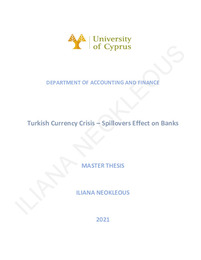| dc.contributor.advisor | Milidonis, Andreas | en |
| dc.contributor.author | Neokleous, Iliana | en |
| dc.coverage.spatial | Cyprus | en |
| dc.creator | Neokleous, Iliana | en |
| dc.date.accessioned | 2022-02-16T09:51:52Z | |
| dc.date.available | 2022-02-16T09:51:52Z | |
| dc.date.issued | 2021-05-18 | |
| dc.identifier.uri | http://gnosis.library.ucy.ac.cy/handle/7/65092 | en |
| dc.description.abstract | This study aims to analyze the stock price reactions of 553 listed banks across 15 countries to the currency crisis and political instability in Turkey, within the period of January 2020 and November 2020. The broad aim of this study is to examine the effect of the presence of banks in Turkey on the excess banks' stock returns within the examining period. Excess returns are calculated as the difference between the actual return of each bank and the bank index in each country. During this period, Turkey receives warnings from European Union for sanctions as the east Mediterranean crisis worsens. Sanctions that include tough economic measures unless progress is made in reducing growing tensions with Greece and Cyprus in the Eastern Mediterranean. In addition, U.S presidential elections take place. Many possible flashpoints between NATO allies were smoothed over-under outgoing President Donald Trump. Trump and Turkish President Recep Tayyip Erdogan have a warm relationship. There is a risk that some of those tensions will erupt under a Joe Biden administration and as a result uncertainty during this period spikes (Turak N. 2020). More precisely, the main motivation of this study is driven by the need to answer the question of how this tough measure will affect the Global Economy. For my estimation, the ordinary least squares (OLS) model will be used. The research project will require data collection which will be acquired from SNL financial, Global Financial Database and investing.com. Results find that 11.20% of the variance in bank stock returns can be predicted from the variables non-performing loan to total loans, interest income to average assets, dividend payout ratio, efficiency ratio, loans to total assets, liquid assets to total assets, interest expense to average assets, presence in Turkey, Spread and County. The results reveal that the key variable Turkey presence is statistically significant in 1% 5% and 10% significant level and its coefficient is negative as expected. A bank that has branches in Turkey has a decrease in stock returns 0,293 percentage points more than if a bank has no branches in Turkey. Although, throughout this study, this research faces certain limitations. Despite the fact that we used market adjusted returns and several other control variables, the results should be interpreted with caution as it would have been optimal to have access to a larger sample. | en |
| dc.language.iso | eng | en |
| dc.publisher | Πανεπιστήμιο Κύπρου, Σχολή Οικονομικών Επιστημών και Διοίκησης / University of Cyprus, Faculty of Economics and Management | |
| dc.rights | info:eu-repo/semantics/openAccess | en |
| dc.rights | Open Access | en |
| dc.title | Turkish Currency Crisis – Spillovers Effect on Banks | en |
| dc.type | info:eu-repo/semantics/masterThesis | en |
| dc.contributor.committeemember | Milidonis, Andreas | en |
| dc.contributor.committeemember | Nishiotis, George | en |
| dc.contributor.department | Τμήμα Λογιστικής και Χρηματοοικονομικής / Department of Accounting and Finance | |
| dc.subject.uncontrolledterm | BANKING CRISIS | en |
| dc.subject.uncontrolledterm | CURRENCY CRISIS | en |
| dc.subject.uncontrolledterm | TURKEY | en |
| dc.subject.uncontrolledterm | EXCESS RETURNS | en |
| dc.author.faculty | Σχολή Οικονομικών Επιστημών και Διοίκησης / Faculty of Economics and Management | |
| dc.author.department | Τμήμα Λογιστικής και Χρηματοοικονομικής / Department of Accounting and Finance | |
| dc.type.uhtype | Master Thesis | en |
| dc.contributor.orcid | Milidonis, Andreas [0000-0001-9131-1098] | |
| dc.contributor.orcid | Nishiotis, George [0000-0002-5955-955X] | |
| dc.gnosis.orcid | 0000-0001-9131-1098|0000-0002-5955-955X | |

